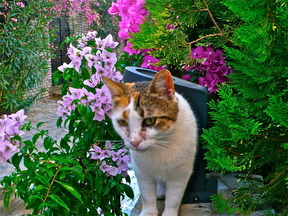Bladder infection
Ear infections
Skin infections
Anal glands
Shedding
Feline diabetes
Constipation/diarrhea
Allergies (with a caveat – some are this easy, some are quite difficult, and some are in the middle)
Dental disease (after a professional dental cleaning so you can start fresh)
Dr. Cathy Alinovi DVM
As a practicing veterinarian, Dr. Cathy treated 80% of what walked in the door — not with expensive prescriptions — but with adequate nutrition. Now retired from private practice, her commitment to pets hasn’t waned and she looks forward to impacting many more pet parents through her books, research, speaking and consulting work. Learn more at drcathyvet.com



























dee
March 9, 2013 at 8:59 pm
Hi, I am inqiring regarding feline diabetes reversed by proper nutrition. Not sure where to go to read your information.
I thank you and my 3 diabetic felines thank you!
Dr Cathy
March 10, 2013 at 9:37 am
I wrote about your specific question on my blog in January 🙂 as it’s an excellent, commonly asked question. (http://www.hoofstockvet.com/blog.html). Boiled down in a nutshell, cats need to eat meat, not carbs.
Bruce
December 6, 2014 at 10:00 pm
We have 2 Cavalier King Charles Spaniels that have a continuing problem with impacted anal glands. We are seeing our vet every two months to have their glands checked and they are always full. The material expressed is greenish brown and the consistency of toothpaste. What kind of nutrition changes should we consider. BTW our vet specializes in allergies so she is thinking along those lines.
Thank you for any help you might be able to provide.
Dr Cathy
December 6, 2014 at 10:16 pm
Simply expressing the anal glands doesn’t take care of the inflammation/infection present in the glands. While treating the allergies, it’s a good idea to treat the leaky gut/dysbiosis that usual accompanies anal gland infections. Adding extra fiber to the diet can help, but a diet of real food really is the starting point.
Bri
December 25, 2014 at 12:16 am
Do cats that don’t currently have any kind of bladder/urinary tract issues but did at one time in the past need a prescription food, or does any kind of healthy food suffice, whether manufactured or made at home? I have a cat like that, and I’ve been told that cats who have previously had urinary problems need to eat foods to prevent any future issues. His vet’s practice told me that the magnesium, phosphorus, and ammonium in the food need to be kept low, with an ideal magnesium being around .05% and an ideal phosphorus around .68%. Is that even necessary, given that he eats a healthy wet food?
Dr Cathy
December 28, 2014 at 12:13 pm
The answer to your questions depends on several things. First, it depends on what the bladder.urinary tract problem was. If the problem was bladder infection, then the biggest thing to make sure is your cat’s urine has a pH between 6.5 and 7.0. If the pH is there, then the canned you are using is fine. If the pH is higher (alkaline), he may be getting ready to have another bladder infection or may not have enough acid in his stomach for proper body pH. If the pH is lower (acid), the food may be overacidifying his body or he may have a lot of stress and be prone to stomach ulcers. If the problem was bladder stones or crystals, the answer will depend on what kind of stones/crystals they were. If they were struvite, the key is still proper urine pH, as described above. If they stones/crystals were other than struvite, then there are specific other issues to address. In general, good food is always the best start, but there may be other subtle health issues hiding that a good urinalysis will reveal.
Bri
January 10, 2015 at 7:27 pm
I’m sorry I’m just now getting back to you. I should have clarified that my cat is currently on a prescription food but I’m questioning whether he even really needs it. In May of 2014 he had a urinary tract infection, with a high white cell count in his urine, that was treated with an injection of Convenia. His urine pH was 8, he had a few struvite crystals, and a little bit of protein in his urine which I was told is not uncommon for cats with these issues. Ever since then though he seems pretty good and right now doesn’t appear to have any symptoms, hence why I was wondering if I could just feed him a non-prescription food that still has the right balance of minerals in order to prevent any problems, or if this is something that, given that he seems fine, is not something to worry about.
Dr Cathy
January 11, 2015 at 2:58 pm
Here are a few considerations: convenia is for respiratory infections and cat bite wounds. It doesn’t treat bladder infections. I’d have another urine sample tested. Struvite crystals can be normal if the sample was kept in the fridge. First, I’d check that the urine sample is normal, if so, meat-based real food or canned should help keep the pH low. However, I’d still check a urine sample every 2-3 months to make sure things don’t come back. Good Luck.
Bri
August 7, 2015 at 7:04 pm
I was only just recently able to get his urine tested. He had no crystals and the pH was 6.5 but he had some bacteria, so he was sent home with some Zeniquin, which he has to be given once a day for 14 days. If his pH is okay, what are some reasons why he might have an infection?